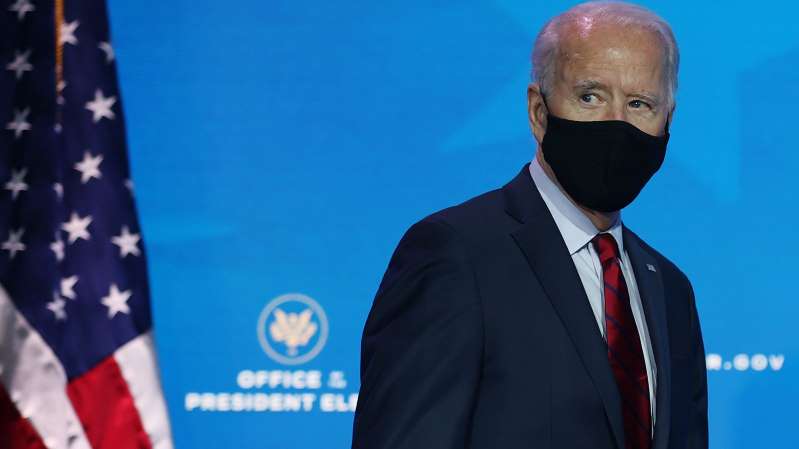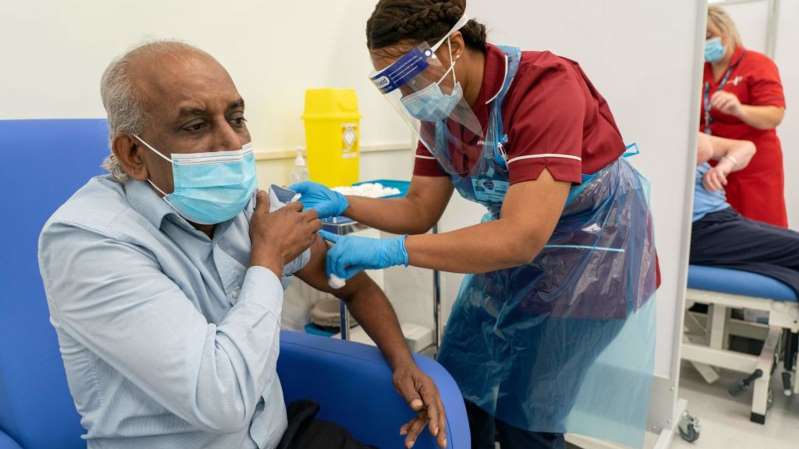'100 million shots in the first 100 days': Biden's promise to turn tide against coronavirus










'100 million shots in the first 100 days': Biden's promise to turn tide against coronavirus
Joe Biden has promised to distribute "100 million shots" of COVID-19 vaccine in the "first 100 days" of his presidency.
Mr Biden, who will take over as US president from Donald Trump in January, was speaking as he introduced his pandemic response team.
He said that Americans should wear masks for 100 days to prevent the coronavirus from spreading and that he would make this mandatory on public transport and in federal buildings.
"In 100 days, we can change the course of the disease and change life in America for the better," he said, adding: "Whatever your politics or point of view, mask up for 100 days."
Mr Biden also said he believed the virus could be well enough under control to allow the "majority" of schools to be reopened during his first 100 days as president.
He said: "My first 100 days won't end the COVID-19 virus. I can't promise that.
"But we did not get into this mess quickly. We're not going to get out of it quickly. It's going to take some time."
The number of US deaths from the coronavirus has soared to an average of more than 2,200 a day, matching the peak seen in April.
More than 283,000 people have died with the virus in the US and the average number of daily cases has passed 200,000 for the first time.

Meanwhile, Mr Trump threatened to use the Defense Production Act to make sure Americans are first in line for US-produced coronavirus vaccines.
The US president was speaking at a summit on vaccine development and distribution, where he signed an executive order to ensure vaccines procured by the US are used there before they are sent anywhere else.
The Defense Production Act was passed in 1950 and allows the president to expand industrial production of key materials or products for national security.
Mr Trump said: "If necessary... we'll invoke the Defense Production Act, but we don't think it will be necessary.
"If it is, it's a very powerful act, as you know, because we've used it very, very successfully."
:: Subscribe to Divided States on Apple Podcasts, Google Podcasts, Spotify, Spreaker
Mr Biden's team was not invited to the summit, despite the fact that they will be handling most of the vaccine distribution effort.
Mr Trump, meanwhile, appeared to be still struggling with the fact that he had lost November's election.
When asked why none of Mr Biden's team had been invited, he said: "We're going to have to see who the next administration is, because we won in those swing states and there was terrible things that went on. But whichever the next administration is will really benefit by what we have been able to do.
"Hopefully the next administration will be the Trump administration."
The US has not yet given the go ahead for the widespread use of a coronavirus vaccine, but the jab from Pfizer - the one that has been rolled out in the UK - is expected to be approved this week.
Reference: Sky News: 17 hrs ago
People won't have COVID vaccine choice in first months of rollout - English medical officer










People won't have COVID vaccine choice in first months of rollout - English medical officer
LONDON (Reuters) - People will not have a choice over which COVID-19 vaccine they will receive in the first months of rollout, England's Chief Medical Officer said on Wednesday, adding the initial option would be either to receive a good vaccine or get no vaccine.
Chris Whitty said that by next autumn, there could be enough supply of different types of vaccine with different properties for there to be clinical reasons why one would be more suitable for a certain person that the other.

"A situation where we have enough vaccines that you have a choice which one you wish, (that) will be a very nice problem for us to have. It is not the problem we have at the moment and it is not problem we're going to have for the next four months," Whitty told lawmakers.
"Currently, if the choice is between a good vaccine and no vaccine, I'm going to just go for whichever good vaccine is available."
(Reporting by Alistair Smout, Editing by Paul Sandle)
Vaccine will 'substantially reduce deaths' - and UK will have up to four jabs to use by mid-2021











Vaccine will 'substantially reduce deaths' - and UK will have up to four jabs to use by mid-2021
The coronavirus jab being rolled out across the UK will "substantially" reduce deaths and there will be up to four vaccines to use by the middle of next year, the chief medical officer for England has said.
Professor Chris Whitty also said the Pfizer/BioNTech vaccine will drastically reduce hospital admissions from COVID-19.
A UK-wide rollout of the vaccine began on Tuesday in what health leaders hailed as a "turning point" in the pandemic.
Professor Whitty told the Commons Science and Technology Committee this morning that he expected the UK to have between three to four vaccines to choose from by the middle of 2021.
However he also advised the rollout process should still proceed "carefully".
Professor Whitty said: "The aim would be to roll out this vaccine and any others that get a licence and are effective and safe.
"We expect probably by the middle of the year to have a portfolio of three or four vaccines which we can actually use."
Professor Whitty also said he believes the Pfizer/BioNTech vaccine is likely to reduce transmission of the virus, and continued: "It will reduce the mortality rate substantially.
"Then it'll start to reduce the number of people who go into hospital.
"And at a certain point, through society, through political leaders, will say this level of risk is something we are prepared to tolerate.
"For example, in an average year 7,000 people die of flu.
"At this point, the risk is now low enough that we can do away with the most onerous things we have to deal with."
The government's chief scientific adviser Patrick Vallance, who was also sat before the committee, said the "biggest risk we face now is that people think it's all over".
He continued: "It isn't all over.
"We have a very important light at the end of the tunnel, but we're a long way off.
"It's not the time to relax things. If that happens we will have a big surge."
He also said there would still be coronavirus transmission among the population once the most vulnerable are vaccinated.
When asked when lockdowns will no longer be needed, he replied: "It's a science-informed political decision.
"What we're looking at is exactly that sort of question, as to depending on the effects of the vaccine on transmission, which we don't know yet, as Chris (Whitty) has said, you would have different models as to what that would mean in terms of the degree of immunity across the population you will end up with, that will be relevant to keeping suppression of transmission versus protecting those who are most vulnerable.
"Priority number one has to be protect those who are most vulnerable, you can see the effects of that.
"There will still be transmission amongst others at that point, so we need to be aware of that, and then we will know a bit more as we learn about transmission across the different vaccines, what effect they have.
"But, ultimately, then there are some decisions to be made about how much risk society wishes to take with that."
Professor Whitty later described so-called "anti-vaxxers", people who are opposed to the vaccination rollout, as a "small group with very weird views".
He continued: "They are almost not worth acknowledging in public communication terms because nothing will persuade them.
"But there are people who are waiting to see - and that is entirely reasonable."
The committee went on to ask the government advisers what can be learned from the UK's handling of the pandemic so far, with the scientists saying testing and contact-tracing were two main areas.
Sir Patrick Vallance said it would have been beneficial for the UK to have pre-trained contact-tracers.
Analysis: The vaccine rollout doesn't let the government off the hook
By Thomas Moore, science correspondent
It is vital to learn the lessons from the coronavirus pandemic, and that will be helped by this forensic inquiry by MPs into what has gone well and what hasn't.
Vaccines are a huge success, of course.
The UK has more vaccines pre-purchased per head than any other country, and yesterday's world-first roll out of the Pfizer jab is a direct result of the early call made by the government's chief scientist that they would be the way out of the pandemic.
Within the next few months it is likely there will be several vaccines approved and in use, with doctors having to choose which to use. It's a nice problem to have.
But there are other aspects where the government's response has been inadequate.
The lack of testing capacity meant the authorities lost sight of the virus in the spring, allowing it to spread widely, below the radar.
By the time capacity increased it was too late for contact tracing and self-isolation to bring the epidemic back under control.
The decision to lockdown in the spring was also taken too late. A delay of just a week may well have cost something like 20,000 lives.
So there are questions to be asked about the accuracy of the epidemic modelling and whether the government responded quickly enough to the steep rise in cases.
Of course an inquiry has the benefit of hindsight, so the question for MPs on the science and technology and the health select committees is whether the government and its advisers responded appropriately, based on the information they had at the time.
This was a new virus that was poorly understood. The science evolved and advice changed - for example on face masks - and that's a reasonable evidence-based approach.
But Asian countries lost no time in preparing for a significant outbreak when China warned of an emerging virus. The UK, and to be fair, some other European countries, just didn't believe a coronavirus was a threat.
A lot of the government's problems are down to transparency and communication. Mixed and confusing messages undermine public trust in the social distancing rules that make absolute sense from a health perspective, but come at the cost of our liberty.
People with history of allergic reactions warned against getting vaccine










People with history of allergic reactions warned against getting vaccine
UK regulators have issued a warning that people who have a history of “significant” allergic reactions should not currently receive the Pfizer/BioNTech Covid-19 vaccine.
Reference: Mirror Uk
Articles - Most Read
- Home
- LIVER DIS-EASE AND GALL BLADDER DIS-EASE
- Contacts
- African Wholistics - Medicines, Machines and Ignorance
- African Wholistics -The Overlooked Revolution
- African Holistics - Seduced by Ignorance and Research
- The Children of the Sun-3
- Kidney Stones-African Holistic Health
- The Serpent and the RainBow-The Jaguar - 2
- PART ONE: DIS-EASE TREATMENT AND HEALTH-3
- 'Tortured' and shackled pupils freed from Nigerian Islamic school
- King Leopold's Ghost - Introduction
- PART ONE: DIS-EASE TREATMENT AND HEALTH-4
- PART ONE: DIS-EASE TREATMENT AND HEALTH-2
- PART ONE: DIS-EASE TREATMENT AND HEALTH-5
- African Wholistics - Medicine
- Menopause
- The Black Pharaohs Nubian Pharaohs of Ancient Egypt
- The Mystery System
- PART ONE: DIS-EASE TREATMENT AND HEALTH-6
Who's On Line?
We have 142 guests and no members online
Ad Agency Remote
Articles - Latest
- The Male G Spot Is Real—and It's the Secret to an Unbelievable Orgasm
- Herbs for Parasitic Infections
- Vaginal Care - From Pubes to Lubes: 8 Ways to Keep Your Vagina Happy
- 5 Negative Side Effects Of Anal Sex
- Your Herbs and Spices Might Contain Arsenic, Cadmium, and Lead
- Struggling COVID-19 Vaccines From AstraZeneca, BioNTech/Pfizer, Moderna Cut Incidence Of Arterial Thromboses That Cause Heart Attacks, Strokes, British Study Shows
- Cartilage comfort - Natural Solutions
- Stop Overthinking Now: 18 Ways to Control Your Mind Again
- Groundbreaking method profiles gene activity in the living brain
- Top 5 health benefits of quinoa
- Chromolaena odorata - Jackanna Bush
- Quickly Drain You Lymph System Using Theses Simple Techniques to Boost Immunity and Remove Toxins
- Doctors from Nigeria 'facing exploitation' in UK
- Amaranth, callaloo, bayam, chauli
- 9 Impressive Benefits of Horsetail
- Collagen The Age-Defying Secret Of The Stars + Popular Products in 2025
- Sarcopenia With Aging
- How to Travel as a Senior (20 Simple Tips)
- Everything you need to know about mangosteen
